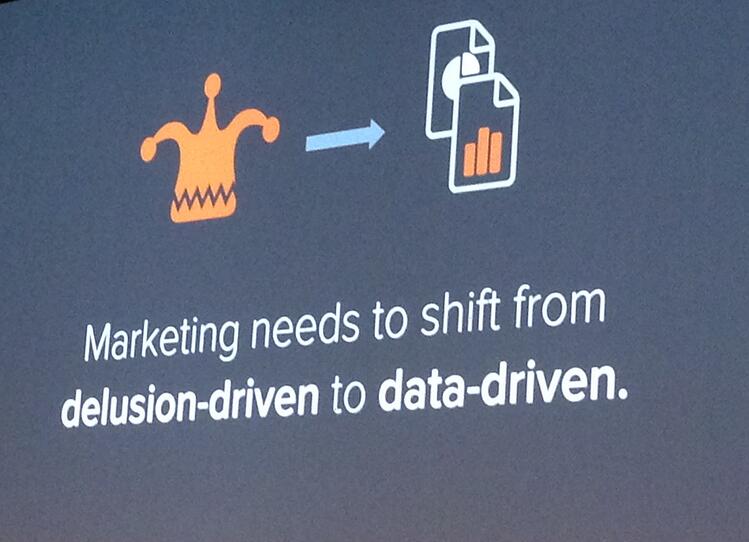
Have you set up SMART marketing goals for your business?
SMART stands for Specific, Measurable, Attainable, Relevant, and Time-Bound. SMART goals are possibly the most effective way of focusing attention and making things happen in your business.
When combined with inbound sales & marketing principles, SMART goals are a sure way of delivering on ROI. They force you to think deliberately about your actions and how they relate to the results you're trying to achieve. SMART goals help banish delusion-driven marketing.
>> See The State of Inbound Marketing: Banish Delusion-Driven Marketing!
Let's explore why SMART marketing goals are so effective and why you need them.
SMART Marketing Goals Are:
Specific
Specific - Goals must be written so that they are clear and refer to a particular part of the business. Instead of: “This year, we'll improve our online marketing,” consider how much more specific “By the end of Q2 2015, we will increase traffic to our website by 25%” is.
If you're not sure what specific looks like for your goal, consider these questions that SMART Goals - How to Make Your Goals Achievable recommends you answer:
- What do I want to accomplish?
- Why is this goal important?
- Who is involved?
- Where is it located?
- Which resources or limits are involved?
When creating your SMART goal, be as concise and specific as possible. The more specific the goal, the more likely you are to achieve it.
Measurable
Measurable - Measurable goals can actually be quantified and, as a result, tracked.
In the example above, increasing website traffic by 25% is measurable. You are able to identify the starting point (current website traffic) and whether you have reached the end result (current traffic + 25%). Without that measure, your goal remains abstract.
With the right tools, you can measure your progress against those goals on an ongoing basis. SmartSheet, for example, offers a management template for doing so.
Attainable
Attainable - SMART goals must be realistically attainable based on your existing skills, resources, and timeframe.
For example, if you received 500 visits to your company website last month, you can't reasonably expect to get 50,000 visits the next month.
Similarly, if you've generated an average of 10 leads every month, jumping to 2,000 leads in one month is unlikely. Many businesses do this to push employees to "go as far as they possibly can." (Sound familiar?) In reality, all this does is discourage.
SMART goals are goals you can actually achieve. They encourage success.
Relevant
Relevant - To be effective, SMART goals must be relevant to the business. If the goals focus on a result that the business can't handle, the goal is irrelevant.
For example, if your current website can't handle more traffic, you may want to rethink your goal to increase web traffic by 25%. Perhaps the goal becomes needing to identify and implement a new website solution within the next three months.
Once you've reached that particular goal, you can focus on increasing web traffic with a digital tool that can handle it.
Time-Bound
Time-based or Time-Bound - Goals must have a deadline or time frame by which they should be achieved. Without that specific deadline, the goal becomes a moving target and unlikely to be reached.
If you are looking to increase your website traffic by 25%, how you reach that goal will differ depending on whether you intend to do so in 3 months or in 3 years.
Without SMART goals, your marketing is delusion-driven!
How SMART Marketing Goals Relate to Inbound Marketing
SMART marketing goals matter more than ever given how much information we have to deal with on an ongoing basis.
Rather than be distracted by the constant pace of change, non-stop emails, and an ever-increasing wealth of data points available to track (think page sessions, conversions, email stats, social activity and referrals, etc.), why not embrace SMART goals to stay focused and ensure that what needs to happen for the business actually happens!
Here's what I appreciate about the SMART marketing goals process:
-
You can't help but get your hands dirty. If you're going to be specific, you have to think about what you've done, how that worked, what you want to do more of, etc.
-
By thinking specifically and including measures, you consider past results. You analyze what worked. You consider the levers you have available to deliver on goals and how to make smart use of them. If you need to increase traffic by 25% within 3 months, you'll need to come up with a robust content plan and calendar to deliver on the goal.
-
SMART goals force you to plan ahead. You begin with the end in mind and consider the various steps necessary to reach the end.
-
You proactively think about bundling activities into marketing campaigns (see Planning a Campaign? Try an Inbound Marketing Campaign!).
-
You embrace a discipline of planning ahead and developing expectations for all of your marketing activities.
Yes, it can be difficult to figure out what to measure and how the measurements interrelate given all of the online data available to marketers. Proving ROI can be difficult and frustrating (see this study published in the SocialTimes); however, it's a great deal easier with SMART goals.
SMART Goals Go Beyond Marketing
Although I've focused on marketing in this article, SMART goals are equally relevant for sales, service, and any other business function.
SMART goals provide you with a process that gets you closer to not only achieving your goals but also measuring your progress. With SMART goals, you'll be programmatic about what steps to take to realistically deliver results in the time frame you've identified.
Ready to give SMART marketing goals a try? Download the xls SMART Goal template.
Then, let me know how they worked for you.
Thanks for reading!
Note: We originally published this article on 01/29/2015. Given how timeless SMART goals are, we've updated this article about them with additional resources.










